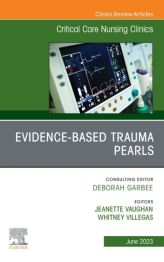In this issue of Critical Care Nursing Clinics, guest editor Dr. Jeanette Vaughan brings her considerable expertise to the topic of Evidenced-Based Trauma Pearls. Top experts in the field provide evidence-based pearls on key topics such as airway management, spinal cord injuries, chest trauma, geriatric frailty trauma, TBI, falls, trauma and the obstetric patient; and more.
Key Features
-
Contains 13 relevant, practice-oriented topics including the multidisciplinary team in critical care; ethical dilemmas in critical care; LGBT+ and trauma; social determinants of health in trauma patients; victim mental health trauma; and more.
-
Provides in-depth clinical reviews on evidenced-based trauma pearls, offering actionable insights for clinical practice.
-
Presents the latest information on this timely, focused topic under the leadership of experienced editors in the field. Authors synthesize and distill the latest research and practice guidelines to create clinically significant, topic-based reviews.
Author Information
Edited by Jeanette Vaughan, DNP, RN, CCRN, CNL, Instructor of Clinical Nursing, Louisiana State University Health Sciences Center, Formerly, Professor of Nursing, Collins College and Whitney Villegas, AGPCNP-BC, APRN, BSN, RN, John Peter Smith Hospital
Evidence-Based Pearls: How the Healthy Work Environment Effects Multidisciplinary Trauma Teams
Airway Management in Trauma Patients
Acute Management of Cervical Spinal Cord Injuries
Evidence-Based Pearls: Chest Trauma
Ethical Challenges in the Care of the Trauma Patient
Geriatric Trauma and Frailty: Improving Outcomes Through Multidisciplinary Care
Evidence-Based Pearls: Falls in the Intensive Care Unit
Evidence-Based Pearls: Traumatic Brain Injury
The Complexity of Trauma for LGBTQD People: Considerations for Acute and Critical Care
Management of Intra-abdominal Traumatic Injury
Trauma in the Obstetric Patient
Impact of the Social Determinants of Health on Adult Trauma Outcomes
Using Principles of Therapeutic Communication to Enhance Trauma-Informed Care in the Critical Care Setting to Promote Positive Encounters


